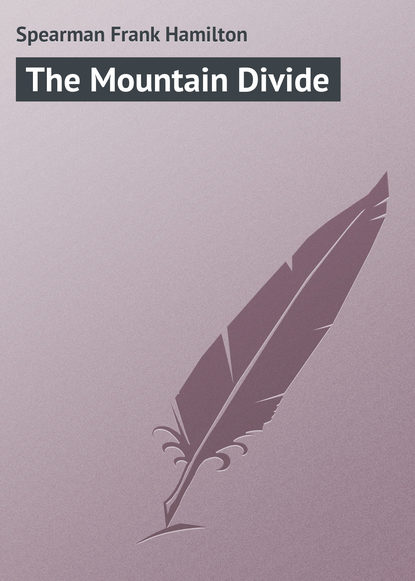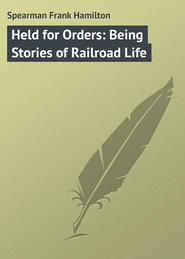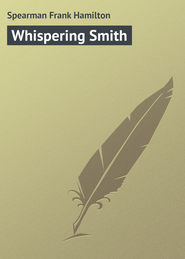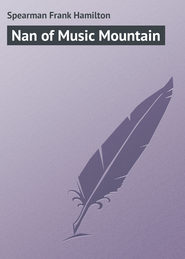По всем вопросам обращайтесь на: info@litportal.ru
(©) 2003-2024.
✖
The Mountain Divide
Автор
Год написания книги
2017
Настройки чтения
Размер шрифта
Высота строк
Поля
“They are after me, Bucks,” cried Baggs, closing the door in desperation. “They will kill me–hide me or they’ll kill me.”
Before the operator could ask a question in explanation, almost before the words were out of the frightened engineman’s mouth, and with Bucks pointing with his poker to the door, trying to tell Baggs to lock it, the door again flew open and Bucks saw the face of a Front Street confidence man bursting through it.
Bucks sprang forward to secure the door behind the intruder, but he was too late even for that. Half a dozen more men crowded into the room. To ask questions was useless; every one began talking at once. Baggs, paralyzed with fear, cowered behind the stove and the confidence man, catching sight of him, tried to crowd through the wicket gate. As he sprang toward it, Bucks confronted him with his poker.
“Let that gate alone or I’ll brain you,” he cried, hardly realizing what he was saying, but well resolved what to do.
The gambler, infuriated, pointed to Baggs. “Throw that cur out here,” he yelled.
Baggs, now less exposed to his enemies, summoned the small remnant of his own courage and began to abuse his pursuer.
Bucks, between the two men with his poker, tried to stop the din long enough to get information. He drew the enraged gambler into a controversy of words and used the interval to step to his key. As he did so, Baggs, catching up a monkey-wrench that Bucks ordinarily used on his letter-press, again defied his enemy.
It was only a momentary burst of courage, but it saved the situation. Taking advantage of the instant, Bucks slipped the fingers of his left hand over the telegraph key and wired the despatchers upstairs for help. It was none too soon. The men, leaning against the railing, pushed it harder all along the line. It swayed with an ominous crack and the fastening gave way. Baggs cowered. His pursuers yelled, and with one more push the railing crashed forward and the confidence man sprang for the engineer. Baggs ran back to where Bucks stood before his table, and the latter, clutching his revolver, warned Baggs’s pursuers not to lay a hand on him.
Defying the single-handed defender, the gambler whipped out his own pistol to put an end to the fight. It was the signal for his followers, and in another minute half a dozen guns covered Bucks and his companion.
Seconds meant minutes then. Bucks understood that only one shot was needed as the signal for his own destruction. What he did not quite realize was that the gambler confronting him and his victim read something in Bucks’s eye that caused him to hesitate. He felt that if a shot were fired, whatever else happened, it would mean his own death at Bucks’s hand. It was this that restrained him, and the instant saved the operator’s life.
He heard the clattering of feet down the outside stairway, and the next moment through the open door on the run dashed Bill Dancing, swinging a piece of iron pipe as big as a crowbar. The yardmaster, Callahan, was at his heels, and the two, tearing their way through the room, struck without mercy.
The thugs crowded to the door. The narrow opening choked with men trying to dodge the blows rained upon them by Dancing and Callahan. Before Baggs could rub his eyes the room was cleared, and half a dozen trainmen hastily summoned and led by a despatcher were engaged out upon the platform in a free fight with the Front Street ruffians.
Within the office, the despatcher found Bucks talking to Callahan, while Baggs was trying to explain to Bill Dancing how the confidence men had tried to inveigle him into a “shell” game and, when they found they could not rob him of his month’s pay in any other way, had knocked him down to pick his pockets.
Callahan, who knew the trouble-making element better than any of the railroad men, went up town to estimate the feeling after the fight, which was now being discussed by crowds everywhere along Front Street. For every bruised and sore head marked by the punishment given by Dancing in the defence of Baggs a new enemy and an active one had been made.
Stanley came in late from the west and heard the story of the fight. His comment was brief but significant. “It will soon be getting so they won’t wait for the railroad men to draw their pay. They will come down here,” said he ironically, “to draw it for them.”
CHAPTER XX
A second and more serious disturbance followed close on the fight at the railroad station. A passenger alighting in the evening from a westbound train was set upon, robbed, and beaten into insensibility within ten feet of the train platform. A dozen other passengers hastened to his assistance. They joined in repulsing his assailants and were beating them off when other thugs, reinforcing their fellows, attacked the passengers and those railroad men that had hurried up to drive off the miscreants.
In the mêlée, a brakeman was shot through the head and a second passenger wounded. But the railroad men rallied and, returning the pistol fire, drove off the outlaws.
The train was hurried out of town and measures were taken at once to defend the railroad property for the night. Guards were set in the yards, and a patrol established about the roundhouse, the railroad hotel and the eating-house and freight-houses.
Stanley, with his car attached to the night passenger train, was on his way to Casement’s camp when the fight occurred, and had taken Bucks with him. The despatch detailing the disturbance reached him at a small station east of Point of Rocks, where he was awakened and the message was read to him advising the manager of the murder of the brakeman.
A freight-train, eastbound, stood on the passing track. Stanley roused Bucks and, notifying the despatchers, ordered the engine cut off from the freight-train, swung up into the cab, and started for Medicine Bend. As they pulled out, light, Stanley asked for every notch of speed the lumbering engine could stand, and Oliver Sollers, the engineman, urged the big machine to its limit.
The new track, laid hastily and only freshly ballasted, was as rough as corduroy, and the lurching of the big diamond stack made the cab topple at every rail joint. But Sollers was not the runner to lose nerve under difficulties and did not lessen the pressure on the pistons. If Stanley, determined and silent, his lips set and hanging on for dear life as the cab jumped and swung under him, felt any qualms at the dangerous pace he had asked for, he betrayed none. With Bucks, open-eyed with surprise, hanging on in front of him, Stanley gave no heed to the bouncing, and the freight-engine pounded through the mountains like a steam-roller with a touch of crushed-stone delirium. Hour after hour the wild pace was kept up through the Sleepy Cat Mountains and across the Sweet Grass Plains. There was no easing up until the frantic machine struck the gorge of the Medicine River and whistled for the long yards above the roundhouse.
Things had so quieted down by the time Stanley, springing up the stairs two steps at a time, reached the despatchers’ office, that they were sorry they had sent in such haste for him. Stanley himself had no regrets. He knew better than those about him the temper of the crowd he had to deal with and felt that he needed every minute to prepare for what he had to do. Bucks was sent to bring in Dancing, Bob Scott, and the more resolute among the railroad men. A brief consultation was held, and the attitude of the gamblers carefully discussed.
Scott, who had been up town since the murder, had collected sufficient proof that the chief outlaw, Levake, had done the shooting, and Stanley now sent Scott to Brush, the sheriff, with a verbal message demanding Levake’s arrest.
Every man that heard the order given knew what it meant. Every one that listened realized it was the beginning of a fight in which there could be no retreat for Stanley; that it would be a fight to a finish, and that no man could say where it would end.
Bob Scott hitched his trousers at the word from his sandy-haired chief. For Bob, orders meant orders and the terror of Levake’s name in Medicine Bend had no effect on him.
“You might as well ask a jack-rabbit to tackle a mountain lion as to try to get Brush to arrest Levake,” declared Dave Hawk cynically.
But Stanley’s hand struck the table like a hammer: “We are going to have a show-down here. We will go through the forms; this is the beginning–and I am going to follow it to the end. Either Levake has got to quit the town or I have.”
Dave Hawk looked around with a new idea. He bent his eyes on Bob: “Better get Brush to deputize you to make the arrest.”
“That is it!” exclaimed Stanley. “Get him to deputize you, Bob, and we will clean up this town as it hasn’t been cleaned since the flood.”
Scott shook his head: “I don’t believe Brush has the sand for that. We will see.”
Up Front Street, through the various groups of men still discussing the events of the evening, Scott, followed only by Bill Dancing, made his way, nodding and patiently or pleasantly grinning as the greetings or ridicule of the crowd were thrown at him. He went to the rooms of the sheriff only to find them locked, and made his way down town again looking through the resorts in a search for Brush.
After much trouble, he found him at a gaming-table, inclined to appear sceptical as to the story that Levake had killed an unoffending brakeman. When Scott repeated Stanley’s demand that Levake be arrested, the sheriff slammed down his cards and declared he would not be made a cat’s-paw for any man; that the brakeman, according to accounts reaching him, had been killed in a fair fight and he would hear no more of it. Then, as if his game had been unreasonably interfered with and his peace of mind injured, he rose from the table to relieve his annoyance.
Meantime Bill Dancing slipped into his vacated seat, picked up the discarded hand of cards and announced it was too good to throw away. “Will anybody,” Bill asked dryly, “play the hand with me while Brush is arresting Levake?” The laugh of Brush’s own companions at this proposal stung him as an imputation of his cowardice, and he made an additional display of rage to counteract the unconcealed contempt in which his cronies held him.
He turned on Scott angrily. “Go arrest the man yourself, if you want him,” he thundered.
Scott snapped up the suggestion. He pointed a lean finger at the shifty peace officer. “Deputize me to do it, if you dare, Brush!” he softly exclaimed, fixing his brown eyes on the flushed face of the coward.
Not a man in the room moved or spoke. Brush saw himself trapped. Scott’s finger called for an answer and the sheriff found no escape. “I knew you hadn’t the nerve to give me a deputy’s badge,” laughed Scott, to spur the man’s lagging courage; “you are too afraid of Levake.”
The taunt had its effect. Brush raved about his courage, and Bill Dancing, slapping him ferociously on the back, convinced him that he really was a brave man. Taken volubly in tow by the two railroad emissaries, who were far from being as simple as they seemed, Brush returned to his lodgings at the jail to issue the coveted paper authorizing Scott to serve any warrants in his stead.
Before the ink was dry on the certificate the word had gone down Front Street, and the town knew that Levake’s arrest was in prospect. As Dancing and Scott left the jail and walked down to the station, they were surrounded by a curious throng of men watching for further developments in the approaching crisis of the struggle with outlawry in the railroad town.
The night was far advanced, but a third element was now to make itself felt in the situation. The decent business men had already seen the approach of the storm and resolved on protecting their own interests, which they realized were on the side of law and order. Word had been passed from one to another of a proposed meeting. It was held toward daybreak in a secret place. One and all present were pledged to act together under a leadership then and there agreed upon, and after so organizing, with a resolute merchant named Atkinson at their head, and with a quiet that foreboded no good to the gamblers and outlaws, the men who had gone to the rendezvous as business men left it as vigilantes, banded together to defend their rights and property against the lawless element that had terrorized legitimate business.
In the morning secret word was brought by Atkinson to Stanley of the resolve of the new allies to stand by him in his efforts to rid the town of its undesirables for good and all. It was welcome intelligence, and the railroad chief assured the plucky merchant of his hearty cooperation in the designs of the newly constituted law-and-order committee.
“When the machinery of the law has miserably failed to protect our lives and property,” he said concisely, “we have nothing left for it but to protect them ourselves.” Arms had been telegraphed for and every effort made to secure troops in the emergency. But the Indian uprising had taken every available infantryman and trooper into the north and there was not now sufficient time to get them together for action. The railroad men, Stanley knew, must depend on themselves and upon such assistance as the decent element in the town could render.
Meantime the outlaws were not idle. They spent the day whipping the gamblers and their hangers-on into line, upon the prediction that if they themselves were dispersed scant quarter would be shown their disorderly associates.
Scott spent the day leisurely. Stanley had asked him not to move until his own arrangements for a defensive fight were completed. That the outlaws had secret sources of information even in the railroad circles, came out startlingly. A special train–an express car pulled by an engine–entered the railroad yard at dusk that evening, when a party of men running out from the cover of the freight warehouse attempted to rush it for arms and ammunition.
They were met at the car doors by six of the best men that could be picked up along the line during the day run of the special across the plains. Stanley had wired instructions to head-quarters to send him six men that feared neither smoke nor powder, and six stalwarts taken on at Grand Island, North Platte, and Julesburg guarded the car and tumbled like cats out of a bag upon the surprised raiders.
The encounter was spirited, but it took only a moment to convince the assaulting party that they had made a mistake. Clubbing their heavy revolvers, the guards, any one of whom in close quarters could account for two ordinary men, threw themselves from the car step directly into the crowd and struck right and left. There was no regard for persons, and in the half-dark the Medicine Bend ruffians, surprised and confused, were soon fighting one another.
But one-sided as the contest was, it did not go fast enough to suit the guards, who, seizing the clubs thrown away by the rabble, charged them in a line and drove them up the street. Railroad men who came running from the station to help were too late. The flurry was over and they found nothing to do but to cheer their new aids.
Nor were the gamblers asleep. Word had gone out both east and west of the approaching crisis between the disorderly and the law-and-order elements, and every passenger train into Medicine Bend brought mysterious men from towns and railroad camps who were openly or secretly allied in one or another vicious calling to the classes that were now making a stand for the rule or ruin of the railroad town.
A mob of sympathizers gathered in Front Street to protect from further punishment the party that had tried to capture the express car. But the railroad men had no idea of pursuing the raiders beyond the yard limits, and indeed were restrained by strict orders from doing so. Stanley sent word immediately to the sheriff, demanding the arrest of the new peace-disturbers, but the sheriff no longer made a pretence of arresting law-breakers. In Front Street, the mob, emboldened by their apparent control of the situation and increasing in clamor and numbers, were now in a humor for anything that promised pillage or vengeance. There were still among them a few cool-headed criminals who counselled caution, but these were hooted down by men who had never tasted the rigor of vigilante rule.
Out of a dozen wild schemes broached by as many wild heads of the excited crowd, in which were now lined up for any lawlessness all the idlers, floaters, the improvident, and the reckless elements of a frontier gambling town, one caught the popular fancy. Some one proposed a jail delivery to release Rebstock and Seagrue, persecuted by the railroad company. The idea spread like wildfire, and a score of men, reinforced by more at every door as they proceeded up Front Street, made their way to the jail.










